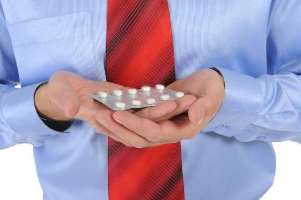The treatment of the inflammation of the prostate gland – prostate gland – in most cases begins with the introduction of an antibiotic in a group of drugs for several weeks. With the remarkable improvement of state of health, therapeutic course, as a general rule, the duration of 2-3 months. If the condition does not improve, it may be necessary to conduct further research.

Treatment options
The therapeutic methods are defined in function of the type of prostatitis.
Useful tips for the treatment and maintenance of prostate health
Medications for prostatitis can help to alleviate the most common problems associated with inflammation and enlargement of the prostate, ease the pain and difficulty in urination, reduce the frequency of false urination during the day and the night. Effective medications for the treatment of prostate problems it is also used for the treatment of chronic inflammation of the prostate and contribute to the conservation of the sexual activity of older adults.
- in a timely manner to begin the actual receipt of the drug – when the first signs of prostatitis try pills, which are also suitable for further treatment after surgery for the treatment of chronic prostatitis pills can remove the major symptoms of inflammation;
- take supplements – modern pharmaceutical market offers a number of products, the action of maintaining the prostate health; you can also take the purposes of the prevention;
- test the effect of the herbs to the strengthening of the health of the prostate, is recommended, for example, nettle or calendula; you can also ask for help to the already prepared herbal mixtures are sold in pharmacies.
In the case of any symptoms of prostatitis, such as a "drip" of the urine or pain when you urinate, see your doctor immediately, as you run the risk of damage to the urinary tract and kidneys.
The treatment and etiology
The use of antibiotics in prostatitis bacterial etiology is the main method of treatment. The doctor may prescribe antibiotics, based at the faculty of medicine background, medical condition and other factors that include the age of the person. For the relief of symptoms can be used as drugs:
- Analgesic, anti-inflammatory and medications to treat it. These include nonsteroidal anti-inflammatory drugs (nsaids); more economic and effective, have aspirinova group.
- Part of the treatment is the receipt from the lungs of laxatives to avoid possible constipation.
The treatment of chronic bacterial inflammation can require a long treatment with antibiotics, especially if symptoms tend to appear again. In some cases, is assigned to prolonged therapy with the introduction of low-dose medications, that aims to reduce the spread of infection and the prevention of the recurrence of urinary tract infection (UTI).
Inflammatory and non-inflammatory prostatitis
Inflammatory and non-inflammatory prostatitis initially, usually requires antibiotic treatment, since the infection is not immediately detected in the course of the investigation. However, experts warn about the non-viability of long antibiotic treatment in the absence of suspicion of the presence of a bacterial infection. Medications that are applied in the case of this disease include:
- Antibiotics. Any medication from the group of antibiotics is the more rapid return of the tool. In the case of the monitoring to improve the state of health, it is likely to take place not previously diagnosed infection.
- The analgesics and nonsteroidal anti-inflammatory drugs (nsaids).
- Muscle relaxants – medications relaxing of the muscles all over the body, or alpha-blockers appointed to the relaxation of the prostate muscles.
- Inhibitors of 5-alpha-reductase drug, inhibiting (decreasing) the growth of the prostate.
- Benzodiazepines – drugs that reduce anxiety. The drugs of this group are able to facilitate the evacuation of the urine by relaxing the muscles around the prostate gland.
- Anticonvulsants – drugs used for the treatment of chronic pain of the nature.
Alpha-blockers
Alpha-blockers trigger the release subverticillate the obstruction by reducing the muscle tone of the smooth muscles of the bladder neck and prostate, which comes as a result of blocking alpha-1 receptor. The drugs of this group have a rapid onset of action (1-2 weeks), do not affect PSA levels, and minimally involved in sexual function. Can lead to a rapid improvement of symptoms and urinary flow.
The most common side effects of alpha-blockers are:
- orthostatic hypotension,
- the pain of head,
- dizziness,
- fatigue,
- peripheral edema,
- the tachycardia and palpitations,
- retrograde ejaculation.

These effects are based affected peripheral and central action, even though many of the drugs uroselective. Alpha-blockers are an option for people with moderate or very symptomatic, require rapid relief. The alpha-blockers have similar clinical effectiveness. If the man does not register an improvement of symptoms within 6-8 weeks of treatment, therapy should be interrupted, as well as the probability of the effect after a prolonged use, is negligible. The combination of the natural enzymes of vegetable origin and of animal origin is a medication of prostatitis, which contains proteolytic enzyme exerts a positive influence on immunity and inflammation (acute, recurrent, and chronic). By taking the complex also quickly resolve edema, ecchymosis and bruising, it disappears the pain. The drug speeds up the healing. These medicines are suitable for maintenance therapy with various inflammations:
- infections of the respiratory tract and the urinary tract,
- gynecological inflammation,
- the inflammation of the prostate,
- the inflammation of superficial veins (in particular, and to the hemorrhoid).
It is also suitable when the pain and the edema, injury-related, the state after the operations (including surgical interventions in the field of dentistry and plastic surgery). The drug also helps with the activity of inflammatory degenerative disease of the joints (arthritis) and other inflammations of the locomotor system. It is a good alternative for people who cannot tolerate pain medications. The tool is also useful in cases where there is violation of lymphatic drainage.
The fruit extract of the plant Serenoa repens. The drug is a plant product, used for the treatment of prostate problems (urology), is designed for men who suffer from urinary violations of the benign prostatic hyperplasia in the I and II stage of the disease and prostatitis. Before you start the treatment it is recommended to consult with your doctor. Visit to a specialist is also recommended that in the event that the person suffers from difficulties when urinating, as well as frequent infections of the urinary tract, kidneys (education and the presence of stones in the urinary tract) or, if a man is a heavy smoker. It is the smokers there is an increased risk of development of cancer in the urinary tract. The medication only improves the problems associated with the extension of the prostate, without affecting the hyperplasia. Therefore, keep the survey of the health care provider through regular intervals of time. To a specialist, you must get immediately if you detect blood in the urine or semen, or painful urge to urinate, accompanied by the inability to urinate (acute urinary retention). If in the family there is a history of cancer before starting the treatment, consult with your doctor.
There is still a urological medication plant-based. It is a combination of extracts of fruit of palm Serenoae Extractum and nettle root. This combination selectively acts on the tissue of the prostate reduces the activity level of the male hormone androgen in the body, in the first place, through the inhibition (blockage) of the enzyme 5-alpha-reductase. This reduces the conversion of testosterone into dihydrotestosterone (the active form of the male sex hormone) and inhibits the enzyme aromatase, with a decrease of the intracellular synthesis of the protein (the intracellular formation of proteins). As a result, is limited to a further increase in the amount of the prostate tissue. Combination of extracts leads to an increase in the flow of urine and the improvement of the difficulty of urination; in addition, the drug has an anti-inflammatory and decongestant (low-swelling) effect.
Without consulting with your doctor next to this drug may be used in the following cases:
- the benign prostatic hyperplasia, in particular, in the first phase (phase I – II),
- the men of middle age or older with functional difficulties associated with the hyperplasia of the prostate, such as the frequent need to urinate (especially at night), violation of urination, weak urinary stream, sensation of incomplete emptying of the bladder, etc
After the consultation with the doctor and the medicine is also used in the following cases: as an alternative during the follow-up after surgery of the prostate, chronic forms of prostatitis (inflammation of the prostate), or (in some cases) of the women with irritation of the bladder.
Conclusion
Prostatitis is a disease that can bring a lot of problems and discomfort. It is, without doubt, require immediate treatment. The therapeutic methods must be prescribed by your doctor, the medication in this case, is not allowed.




































